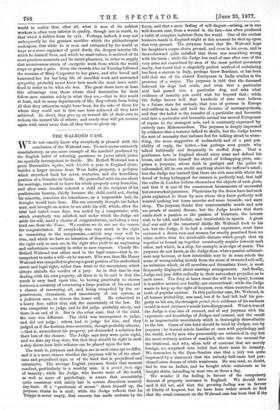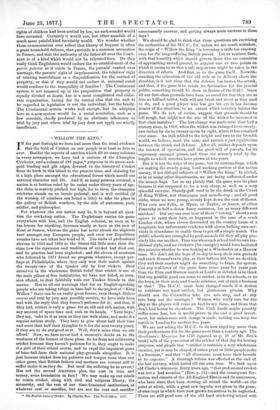THE 1VALROND CASE.
WE do not exactly know why everybody is pleased with the conclusion of the Walrond case. To.us it seems eminently unsatisfactory, as one more example of the mischief produced by the English habit of referring questions to juries which juries are specially incompetent to decide. Mr. Bethel! Walrond was a great Devonshire squire, with £3,000 a year in England alone, besides a larger income from West India property, a pedigree which stretched back for seven centuries, and the hereditary position of a Grandee in Spain. He quarrelled with his son about his marriage, resolved to leave his whole property away from him, and after some trouble selected a child as the recipient of his posthumous bounty, chiefly because the child could not, during his minority, renounce the inheritance, as a responsible heir, he thought, would have done. His son naturally thought his father mad, and brought an action to set aside his will, which, after the trial had lasted some days, was ended by a compromise, with which everybody was satisfied, and under which the Judge set aside the will, amid a chorus of congratulations, including a very loud one from the Times. We confess we do not see the reason for congratulation. If everybody was very much in the right in consenting to the compromise,—which may very well be true, and which we have no intention of disputing,—they were in the right only as men are in the right who yield to an unpleasing and unfortunate necessity in order to save expense. Clearly Mr. Bethell Walrond was either mad in the legal sense—that is, in- competent to make a will—or he was not. If he was, then Mr. Henry Walrond was compelled to give up a great portion of his undoubted moral and legal right, rather than trust to the uncertainty which always attends the verdict of a jury. As in that case he was dealing with his own property, all there is to be said is that the result is very hard upon him, he having practically to choose between a certainty of recovering a large portion of his own and a chance of recovering all, and being compelled by the ex- pensiveness, clumsiness, and uncertainty of our system, as a judicious man, to choose the lesser evil. He submitted to a heavy fine, rather than risk the uncertainty of the law. He was competent to judge, and he did judge, probably wisely, and there is an end of it. But in the other case, that of the child, the case was different. The child was incompetent to judge, and did not judge ; others had to judge for him, and they judged as if the decision were uncertain, though probably adverse, —that is, surrendered his property, yet demanded a solatium for their loss of the chance. The Judge says they were quite right, and we dare say they were, but that they should be right in such a step shows how little reliance can be placed upon the law.
The truth is, jurymen and Judges are in such cases apt to differ, and it is a mere chance whether the jurymen will be of the obsti- nate and prejudiced type, or of the kind that is prejudiced and submissive. The average English juryman thinks that unusual conduct, particularly in a wealthy man, is a prima fade sign of insanity ; while the Judge, who knows more of the world, as well as more of psychology, is aware that eccentricity quite consistent with sanity has in certain directions scarcely any limit. If a " gentleman of means " shuts himself up, the juryman thinks he is mad ; while the Judge reflects that La Trappe is never empty, that remorse has made recluses by the dozen, and that a mere feeling of self-disgust—arising, as in one well-known case, from a wound in the face—has often produced a habit of complete isolation from the world. One of the coolest business-heads in England might at this moment be shut up upon that very ground. The juryman hears that Mr. Walrond kept his daughter's corpse above ground, and even in his room, and is thenceforward quite satisfied that there was something wrong with his brain ; while the Judge has read of case after case of the very same act committed by men of the most perfect pecuniary sanity, has heard that a singularly perfect method of embalming has been a success in Italy, perhaps knew Bentham, or has been told that one of the richest Europeans in India studies in the presence of a corpse. The juryman is told that the deceased believed his dogs had souls, and even that a particular soul had passed into a particular dog, and asks what evidence of insanity you could wish for beyond that ; while the Judge knows well that hundreds of sane men believe in a future state for animals, that tens of persons in Europe and millions in Asia still hold the doctrine of metempsychosis, and that the belief in the transfer of a particular and favourite soul into a particular and favourite animal has moved Europeans of repute to the strangest acts, and is constantly expressed by entirely sane Mahommedans. The juryman is deeply impressed by evidence that a testator talked to skulls, but the Judge knows the sort of necessity that recluses feel for talking aloud to some- thing, the more suggestive of melancholy and of a past pos- sibility of reply, the better,—has perhaps seen people who talked habitually and frequently to stuffed dogs. That a gentleman here in England should carry arms and defend his house, and declare himself the object of kidnapping plots, sur- prises a juryman, whose faith in gaslight and the police is unbounded, till he can credit anything about the sufferer's mind ; but the Judge has learned that there are rich men with whom the dread of being kidnapped for ransom is perfectly real, that half the exiles in London believe themselves the objects of such plots, and that it is one of the commonest harassments of successful but overworked patentees. Physicians by the dozen have had such plots explained to them by men whom they knew perfectly well wanted nothing but horse exercise and some bromide, and more sleep. The juryman thinks that unaccountable words and acts are proofs of mental disease, but the Judge knows that there exists such a passion as the passion of bizarrerie, the intense wish to be odd, and foolish, and incalculable in speech. A great deal was said of the unnatural dislike Mr. Walrond took to his son, but the Judge, if he had a criminal experience, must have sentenced a dozen men and women for cruelty practised from no other motive than the intolerable distaste which people shut up together or bound up together occasionally acquire towards each other, and which, in a ship, for example, is no sign of mania. The jurymen do not know, as the Judge does, what a passion arbitrari- ness may become, or how intolerable may be in some minds the sense of wrong arising merely from the sense of thwarted self-will, an irritation which, as all novelists and dramatists know, is most frequently displayed about marriage arrangements. And finally, Judge and jury differ radically in their antecedent prejudice as to such cases. The Jury at heart want the will to be upset, because it is neither natural, nor kindly, nor conventional; while the Judge wants to keep up the right of bequest, even when exercised in the teeth of popular opinion. In this particular case, Mr. Walrond, in all human probability, was mad, but if he had left half his pro- perty to his son, the strongest prima fade evidence of his madness would in most jurymen's minds have disappeared. What is true of the Judge is true also of counsel, and of any juryman with the experience and knowledge of Judges and counsel, and the result is an impenetrable uncertainty which is thoroughly discreditable to the law. Cases of this kind should be tried by Judges, not by jurymen ; by trained minds familiar at once with psychology and the world, not by men who presumably are unlearned in any but the most ordinary actions of mankind, who take the unusual for the irrational, and who, when told of customs that are merely foreign, are surprised into belief that there must be insanity. We remember in the I)yce-Sombre case that a jury was quite impressed by a statement that the unlucky half-caste had pur- chased some dozens of white waistcoats. He was mad, no doubt, but he was an Indian, and he bought white waistcoats as he bought shirts, intending to wear two or three a day.
We wonder if the feeling in favour of the compulsory descent of property increases in England. We should have
said it did not, and that the growing feeling was in favour of liberty of bequest, but we have been rather struck to find that the usual comment on the Walrond case has been that if the rights of children had been settled by law, no such scandal would have occurred. Certainly it would not, but other scandals of a ranch more painful kind inevitably would. We wonder whether these commentators ever reflect that liberty of bequest is often a great household defence, that parricide is a common accusation in France, and that the authority of the father all over the Conti- nent is of a kind which would not be tolerated here. Do they really think Englishmen would endure the re-establishment of the patria potestas as it exists in France, the parents' control over marriage, the parents' right of imprisonment, the relatives' right of treating wastefulness as a disqualification for the control of property, or that if they would not endure it, universal entail would conduce to the tranquillity of families ? The Continental system is not summed up in the proposition that property is equally divided at death, but is a most complicated and elabo- rate organisation, having for its central idea that the unit to be regarded in legislation is not the individual, but the family. The Continental system works well enough, but its adoption here as a new system would be a social revolution, such as a few scandals, chiefly produced by an obstinate adherence to trial by jury just where trial by jury does not apply are wholly insufficient.



































 Previous page
Previous page